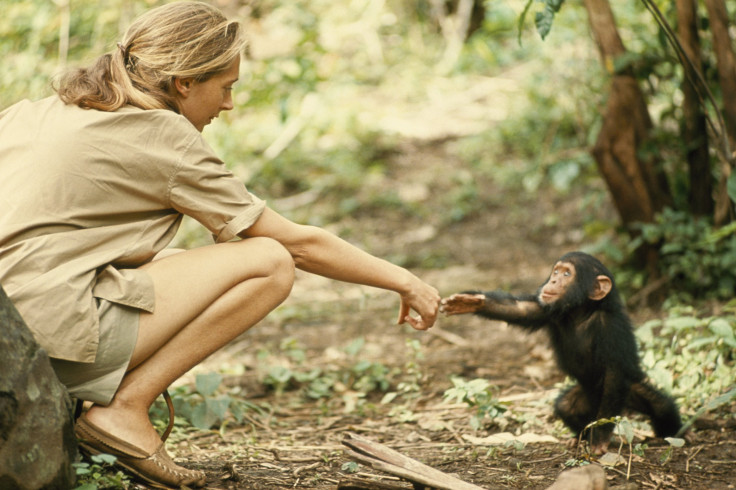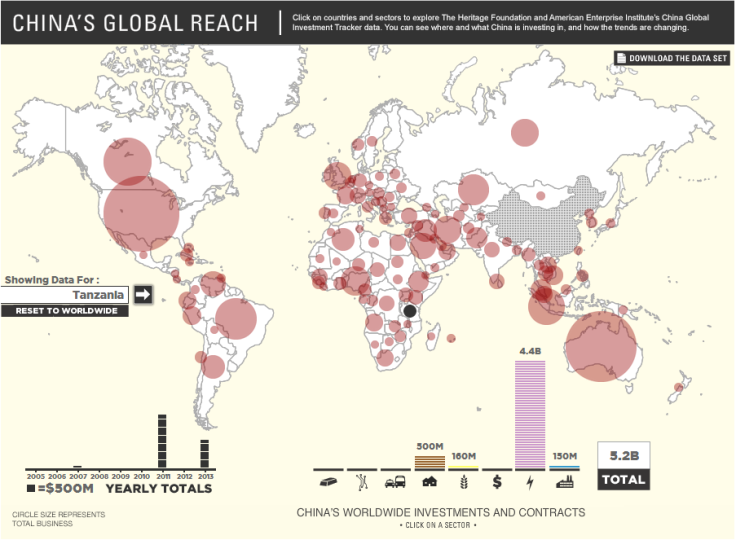China Is Africa's New Colonial Overlord, Says Famed Primate Researcher Jane Goodall

China has spent nearly $100 billion in African projects over the last decade -- and Jane Goodall is not impressed.
In an interview with Agence France-Press published on Monday, the longtime animal rights activist who has spent most of her life on the continent, compared Chinese investment with old-school British colonialism.
“In Africa, China is merely doing what the colonialists did. They want raw materials for their economic growth, just as the colonialists were going into Africa and taking the natural resources, leaving people poorer,” she told AFP in an interview in Johannesburg.
Between 2000 and 2011, China spent more than $73 billion investing in natural resources, mines, oil wells and other projects in Africa, according to statistics from Aid Data and the Center for Global Development, complied by AFP in the map shown below.
Many of the largest projects were oil-related. For instance, a $5.38 billion project in Nigeria that involved “infrastructure in exchange for preferential oil rights bidding,” or $4.04 billion spent in Mauritania for “oil exploration, sewage systems, iron mine and roads.”
Goodall, 80, first ventured to Africa in the 1950s. She soon began working with anthropologist Louis Leakey studying chimpanzees -- the beginning of decades’ worth of research in Tanzania.
Last year, Chinese foreign direct investment in Tanzania-based projects topped $1.5 billion, according to the China Global Investment Tracker, which uses data compiled by the Heritage Foundation.

The majority of projects, worth $4.4 billion, were in the energy sector, which typically means oil-related activities.
It’s a similar story in other countries, where mining and oil dominate Chinese projects. In Nigeria, for example, China invested $20.5 billion in 2013 -- $9.2 billion of which was in the energy sector.
Of course, economically speaking, it’s beneficial to both parties in theory. Chinese projects supply the country’s massive demand, and African countries benefit from jobs and stronger gross domestic product.
But it’s not always that simple, and Jane Goodall isn’t the only one who's not pleased.
Zambia saw $4 billion in Chinese investment last year -- $1.6 billion of which was in mining. But government officials have had a series of spats with foreign companies over their corporate practices.
In December, the Zambia Environmental Management Agency suspended the license of China’s Nonferrous Mining Corporation in the middle of an $832 million project. The agency alleges that the company failed to comply with certain contractual conditions, like setting up a “conflict resolution system” with locals, or taking inventory of all households affected by the project.
It’s not only legitimate business that’s making Goodall angry. She told AFP that Chinese demand supports an increased trade in illegal ivory and rhino horn, which means an increase in poaching.
Recent data from the Convention on International Trade in Endangered Species of Wild Fauna and Flora shows that more than 15,000 elephants were killed for their tusks in more than 27 African countries in 2012, “with the ivory mostly destined for China.”
The activist said that international pressure from other countries can be a force for good, citing recent destruction of tons of ivory in Beijing, and the government banning shark fin soup.
Goodall also runs youth programs with students around the world to help raise awareness about animal rights.
“We work with hundreds of Chinese children, and they are not different from children we work with here,” she said to AFP.
“They all love nature, they love animals, they want to help, there’s no difference because they’re Chinese,” she added.
© Copyright IBTimes 2024. All rights reserved.






















